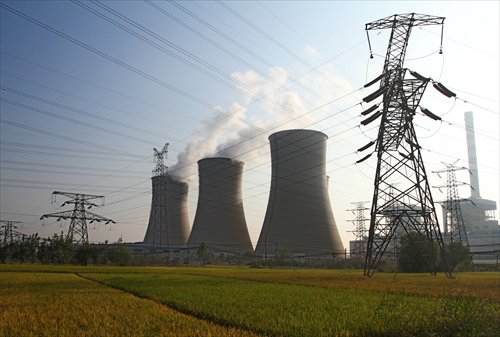Touch trading
Coal firms under pressure as contract talks begin
China's annual coal trade fair heralds a round of negotiations over coal contracts for next year. Power plants are expected to drive a hard bargain this year, amid difficult times for China's coal firms. Policymakers have to strike a balance between bailing out the struggling coal industry, which provides tax revenues and jobs, and reducing dependence on polluting coal-fired power.

Two trucks unload coal in Fangchenggang, South China's Guangxi Zhuang Autonomous Region in August. Photo: CFP
China's annual coal trade fair will start in Xi'an, capital of Northwest China's Shaanxi Province on Friday. The fair will see the beginning of year-end negotiations between coal producers and power generators to secure next year's coal supply.
Analysts expect power companies will hold the upper hand during the upcoming talks, given their high inventories of coal and the market's bearish outlook on coal prices.
Price problem
Coal prices have risen by nearly 7 percent since October, reversing a downward trend since June.
The benchmark Bohai-rim Steam-Coal Price Index (BSPI) rose to 513 yuan ($83.6) per ton as of Wednesday from 482 yuan per ton on October 8, but was still down 9 percent year-on-year.
"A batch of government measures to support the coal industry, including curbing coal production and resuming coal import tariffs, have worked," Liu Dongna, an analyst at commodity consultancy Sublime China Information, told the Global Times Thursday.
The rise of the BSPI has also been attributed partly to deliberate price hikes by big coal firms, so they can demand higher prices when negotiating with power companies, analysts said.
The country's big four coal suppliers - Shenhua Group, China National Coal Group Corp, Datong Coal Mine Group and Inner Mongolia Yitai Group - have raised their coal prices by 30-40 yuan per ton since September.
"Coal suppliers prefer to set contract prices at 510-520 yuan per ton, but power plants will be reluctant to accept the offer," Zeng Hao, an analyst at Shanxi-based Fenwei Energy Consulting Co, told the Global Times Thursday.
Zeng said the recent coal price rise will not be sustainable, adding that coal prices will probably fall below 500 yuan per ton in 2015.
China's coal miners have been hit by falling prices, with nearly 70 percent of them incurring losses in the first three quarters of 2014, according to the China National Coal Association (CNCA).
Anhui-based Huainan Mining Industry Group suffered the most. It posted a loss of 4.02 billion yuan in the first nine months of this year, nearly five times the loss it suffered in the same period a year earlier.
"Coal producers' profitability will not improve in 2015," Liu said, pointing to oversupply and sluggish demand. According to the CNCA, the amount of China's coal overcapacity exceeded 300 million tons by the end of September.
Inventory advantage
For thermal power plants, lower coal prices offer substantial benefits, as coal accounts for nearly 70 percent of the power plants' production costs.
Partly thanks to falling coal prices since 2012, China's five largest power generation groups gained an aggregated record-high profit of more than 74 billion yuan in 2013, compared to a total loss of 15.12 billion yuan in 2011.
The five power groups held work conferences in October, with China Huadian, China Huaneng, China Datang and China Guodian saying the first three quarters of this year saw the best business performance the companies had ever known. China Power Investment Corp also said its business had seen continuous growth in the first nine months.
"Power utilities will hold the superior position in the negotiations with coal suppliers, as they have high inventories of coal and can also use cheap imported coal," Deng Shun, a coal industry analyst with ICIS C1 Energy, told the Global Times Thursday.
Coal inventories at China's key power plants hit a record high of 98.33 million tons as of November 10, compared to 81.2 million tons a year earlier, according to coal information portal sxcoal.com.

A power plant in Huaian, East China's Jiangsu Province Photo: CFP
Flexibility
2014 is the third year in which coal sellers and power utilities are negotiating prices themselves without any government intervention, after China scrapped a regulation that capped spot thermal coal prices in December 2012.
Last year, contracts for the supply of 1.23 billion tons of thermal coal were signed during the year-end negotiations, according to the CNCA. China's power industry consumed 1.47 billion tons of thermal coal in the first nine months of this year.
"The volume of the contracts will be no more than last year's level, as coal-fired electricity generation has seen a decline this year in coastal provinces such as Guangdong," Deng said.
Coal-fired power generation fell by 6.5 percent year-on-year in the third quarter of 2014, according to data from the China Electricity Council.
Last year, most of the contracts only set the volume of the coal supply, while the prices were not fixed. Deng said the situation will be similar this year.
"A flexible price mechanism will be good for both sides, as setting contract prices too high or too low could lead to defaults," he said.
Clean energy coming
China's determination to curb air pollution and control carbon emissions will have an obvious downward effect on coal prices in the long term, analysts said.
The country aims to cap its annual coal consumption at 4.2 billion tons by 2020 as part of an effort to modernize its energy structure, according to the Energy Development Strategy Action Plan (2014-20), which was published Wednesday by the State Council. The figure is still 16.3 percent more than the 3.6 billion tons of coal used in 2013.
China consumed 3.03 billion tons of coal in the first nine months of 2014, down 1.2 percent from a year earlier, data from the CNCA showed.
It was the first time that the country witnessed a year-on-year decline in the use of coal in more than a decade.
Investment in the coal-fired power sector also dropped, falling by 9.2 percent year-on-year in the first three quarters of 2014, data from the China Electricity Council showed.
But China's policymakers are facing a dilemma: Reducing dependence on coal-fired power will depress coal prices, but letting prices fall will cause massive losses for coal companies, according to Deng.
"Improving China's energy structure is a long-term goal for the central government, but some local governments still rely on coal mines to generate tax revenues and create jobs," Liu from Sublime China noted.
Newspaper headline: Coal firms under pressure as contract talks begin